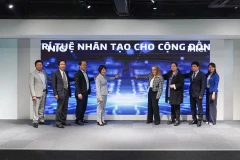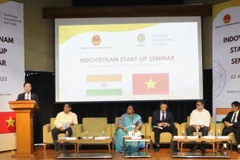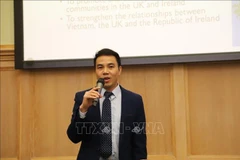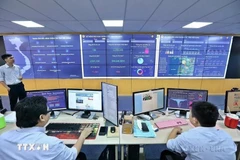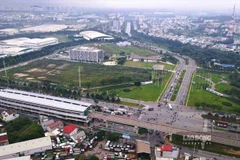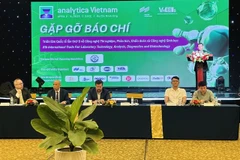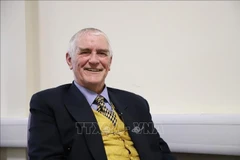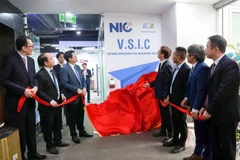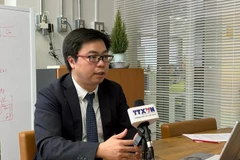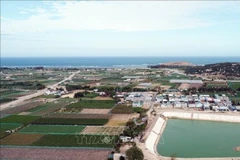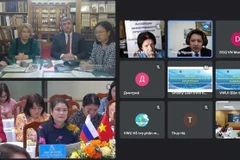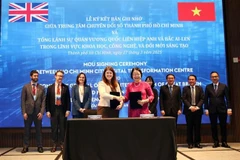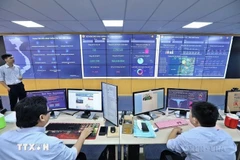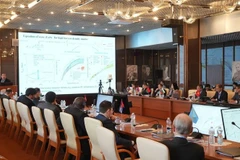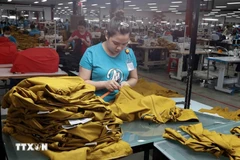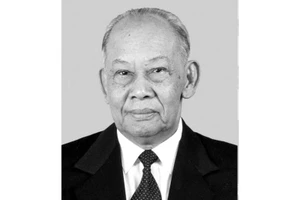 Hoang Ngoc Thuc, Chief Technology Officer (CTO) Vietnam at Nokia says that Vietnam is one of the potential and crucial markets for Nokia. (Photo: VietnamPlus)
Hoang Ngoc Thuc, Chief Technology Officer (CTO) Vietnam at Nokia says that Vietnam is one of the potential and crucial markets for Nokia. (Photo: VietnamPlus)
Hanoi (VNA) – Nokia has revealed its renewed strategic and technological vision, which demonstrates a stronger commitment to supporting Vietnam's digital transformation process and digital economic development.
According to Hoang Ngoc Thuc, Chief Technology Officer (CTO) Vietnam at Nokia, the firm has a strategy to become a leading firm in providing technological innovation services for business-to-business (B2B) companies, and a pioneer in digital transformation.
In a recent interview granted to VietnamPlus e-newspaper, Thuc briefed on plans for Nokia’s development prospects and plans in the Vietnamese market in the coming time.
Nokia gains great achievements in Vietnam
Reporter: How do you perceive the Vietnamese telecommunications market, and in your opinion, what potential and opportunities does Vietnam offer for enterprises like Nokia to develop?
 Nokia expects to develop open ecosystems in Vietnam, thus creating new services for the 5G network. (Photo: VietnamPlus)
Nokia expects to develop open ecosystems in Vietnam, thus creating new services for the 5G network. (Photo: VietnamPlus)
Hoang Ngoc Thuc: Nokia was widely known for providing end-user devices such as mobile phones in the past. However, at present, Nokia has made updates to its strategy, particularly concerning orientations the company intends to take in the near future.
Vietnam is a promising market with its 100-million population. We recognize Vietnam's potential, especially in light of the Government’s support policies for businesses and the country’s digital transformation programmes by 2025, with a vision to 2030.
Recently, Nokia manufactured some telecommunications equipment at its factories in Vietnam, and these are currently being used in numerous countries within the region.
Nokia views Vietnam as one of the key manufacturing hubs that play a vital role in our global supply chain. This is an essential market for Nokia not only in the Asia-Pacific region but also on a global scale.
Reporter: What is the greatest achievement made by Nokia after over 30 years in Vietnam?
Hoang Ngoc Thuc: Nokia has been present in Vietnam since the early 1990s. We have provided solutions and 2G mobile telecommunications infrastructure equipment and solutions to MobiFone since 1993 and VinaPhone since 1996.
After more than 30 years, Nokia has partnered with various network providers to build telecommunications infrastructure ranging from 2G, 3G, 4G, and currently, commercially trialing 5G. The Government emphasised that 5G is an important telecommunication infrastructure that helps Vietnam realise digital transformation and digital economy development goals. It can be said that this is Nokia's greatest achievement in Vietnam.
Reporter: Has Nokia faced any difficulties investing in Vietnam?
Hoang Ngoc Thuc: Recently, the Government and the Prime Minister in collaboration with foreign businesses have organised numerous conferences seeking measures to address challenges facing businesses, and improve policies to attract investment to Vietnam. In Vietnam, Nokia primarily operates in providing services and solutions for traditional telecommunications service providers such as Viettel, VNPT, and Mobifone, Essentially, Nokia has received significant support from the Government and businesses.
 In Vietnam, Nokia is providing mobile and fixed broadband network infrastructure solutions to network providers such as Viettel, VinaPhone, and MobiFone. - Illustrative image (Photo: VNA)
In Vietnam, Nokia is providing mobile and fixed broadband network infrastructure solutions to network providers such as Viettel, VinaPhone, and MobiFone. - Illustrative image (Photo: VNA)
Currently, Nokia is collaborating with partners to manufacture telecommunications equipment, thereby contributing to the foreign direct investment (FDI) growth in Vietnam. We consider Vietnam a significant hub in Nokia's global supply chain.
Collaborating to develop open ecosystems.
Reporter: Per your assessment, it's currently a "golden opportunity" for Nokia to further expand operation in Vietnam. So, what specific collaborations has Nokia engaged in with Vietnamese partners?
Hoang Ngoc Thuc: In early 2023, Nokia refreshed its brand after 60 years, aiming to become a technology leader for business-to-business (B2B). The telecommunications sector has been a traditional customer of Nokia. Additionally, Nokia has also expanded its focus to new customer groups such as enterprises, governments, and technology giants (Webscalers).
In Vietnam, Nokia is providing mobile and fixed broadband network infrastructure solutions to network providers such as Viettel, VinaPhone, and MobiFone.
As far as I know, the number of smartphones in Vietnam hit around 101 million as of the second quarter of 2023, with approximately 86.2 million using 3G/4G mobile broadband services. Statistics show that about 30% of the total number of smartphones in Vietnam support 5G connectivity.
Therefore, I believe that 5G will have significant contributions to changing and creating potential for socioeconomic development. Nokia has been working with government organisations such as the Authority of Radio Frequency Management and the Vietnam Telecommunications Authority under the Ministry of Information and Communications to share Nokia’s experience in performing 303 commercial 5G contracts worldwide.
Nokia has supported network providers and government organisations to prepare the infrastructure and human resources for the upcoming 5G deployment.
The 5G network not only provides broadband services for individual customers but also serves various other customer segments such as factories, ports, airports, and even renewable energy facilities like wind and solar power plants. It can offer services that were previously not achievable by 4G, thanks to its higher speed, lower latency, and increased reliability.
Recently, Nokia has also been collaborating with Vietnamese organisations and agencies in organising and co-organising events and forums to share experience and lessons learned from global 5G deployment programmes and projects. Through these activities, Nokia expects to develop open ecosystems in Vietnam, thus creating new services for the 5G network.
Nokia can confidently proceed with its development in the Vietnamese market. We possess diverse products, and global deployment experience that can be applied effectively in Vietnam.
Heading towards B2B technology strategy
Reporter: What is the specific strategy of Nokia in Vietnam in the coming time?
Hoang Ngoc Thuc: Nokia is focusing on solidifying its position as a global leader in B2B technology innovation towards enhancing its capabilities in network infrastructure development. In Vietnam, in addition to serving major telecommunications clients, Nokia is also expanding its reach to B2B enterprises.
We recognise that there are several sectors holding great potential for development in Vietnam. In August last year, Nokia entered a collaboration with VNPT to accelerate the deployment of private wireless networks for several airports and seaports in Vietnam.
As evaluated by the Global System Mobile Association (GSMA), Nokia accounts for over 50% of the market share in the private wireless infrastructure segment globally, serving more than 635 customers worldwide. It also provides private wireless network solutions for various sectors including manufacturing, transportation, smart city development, and energy. These are also the sectors in Vietnam where the 5G network can be applied in the near future.
For example, with 563 industrial parks and factories nationwide, Vietnam annually attracts over 50% of FDI capital into the production, manufacturing, and processing industries – which are regarded as potential customers for Nokia's services.
Nokia also partners with domestic and international universities and academies in developing human resources in Vietnam. This is crucial because developing digital infrastructure or operating an industrial network infrastructure requires a skilled digital workforce.
Reporter: Does Nokia pin high hopes on the Vietnamese market in its new strategy?
Hoang Ngoc Thuc: According to reports from GSMA, the Asia-Pacific region is expected to lead the world in 5G development. Pioneering countries in the region like Singapore, Japan, the Republic of Korea, and Australia are experiencing rapid 5G growth. It is forecast that by 2025, around 400 billion USD will be invested in infrastructure development in this field in the Asia-Pacific region.
It can be seen that the rapid pace of 5G development is evident, given the scale of investment.
In Vietnam, the 5G network infrastructure is crucial for enhancing personal experiences, and serves as a tool for businesses to increase productivity and achieve sustainable growth.
For major service providers in Vietnam, the 5G network infrastructure also enables them to seek revenue growth by offering new services to businesses. For instance, many seaports in Vietnam could apply smart port solutions to manage cargo handling, harbor areas, and warehouse operations. Similarly, numerous multinational corporations and large manufacturing businesses shifting to Vietnam could utilise 5G infrastructure in their production activities.
The aviation industry, serving hundreds of millions of passengers annually, can utilise 5G to provide high-speed connectivity to passengers on flights and manage operations at airports.
All of these factors indicate that Vietnam is one of the potential and crucial markets for Nokia. In other words, Vietnam is consistently on Nokia's priority list within the Asia-Pacific region, particularly in activities supporting network providers and collaborating with the government to develop mobile networks like digital infrastructure. These collaborative efforts encompass not only 5G but also the next-generation network infrastructure, contributing to implementing the digital economy and society development goals within the digital transformation programme set forth by the government.
Reporter: Thank you for your conversation!





